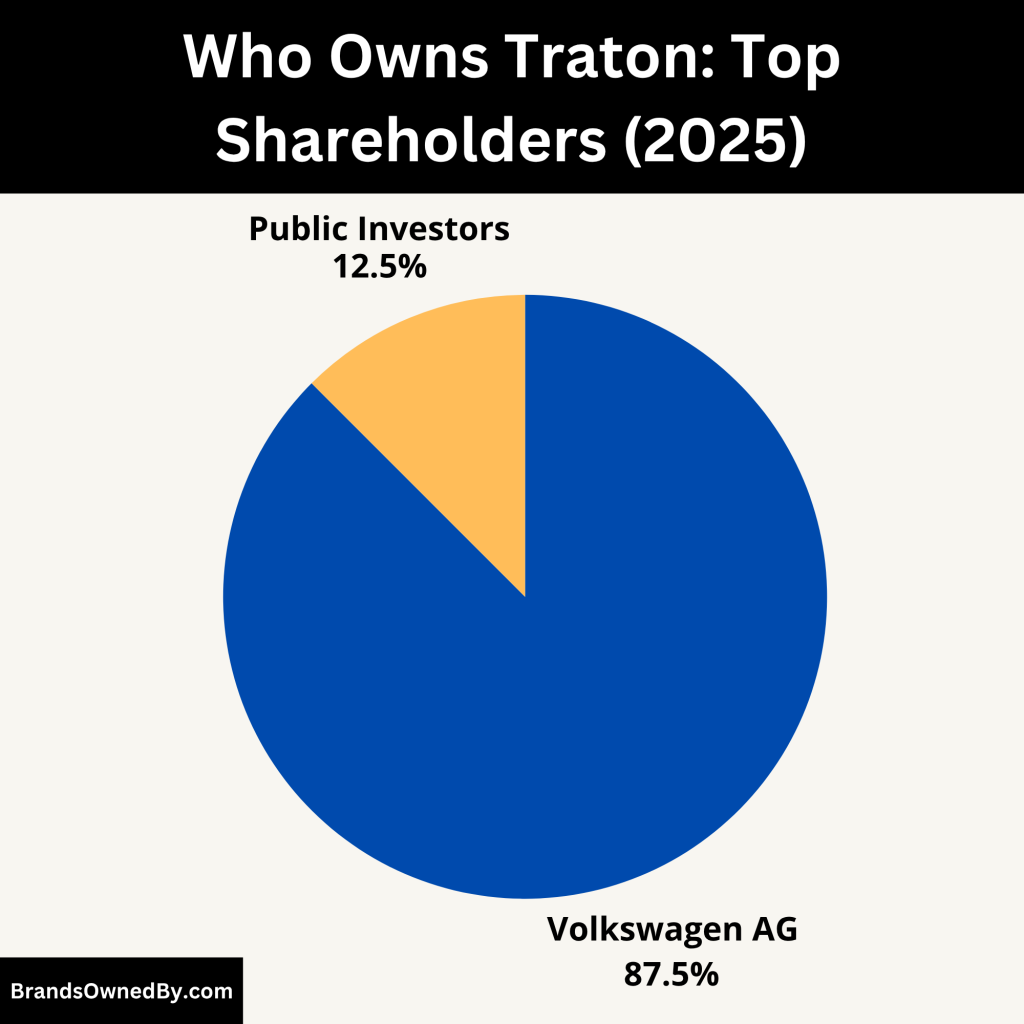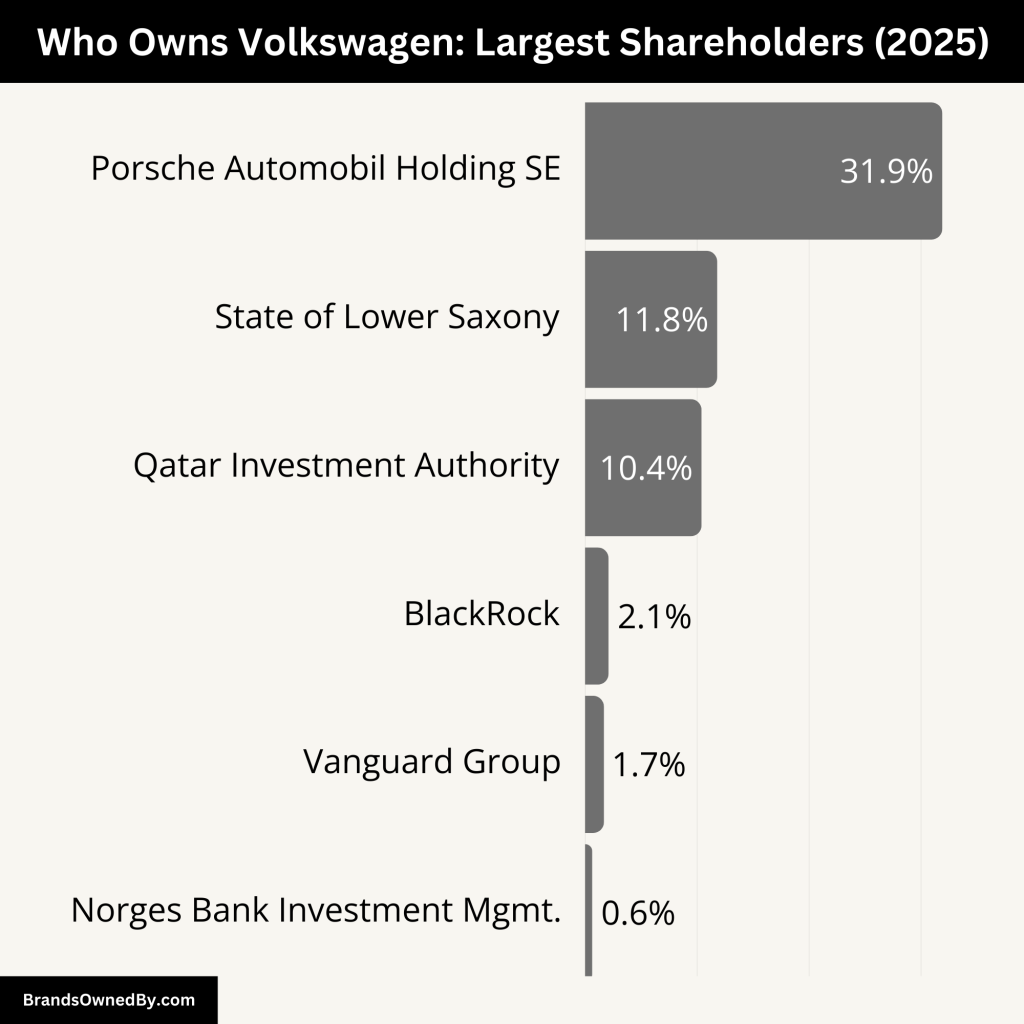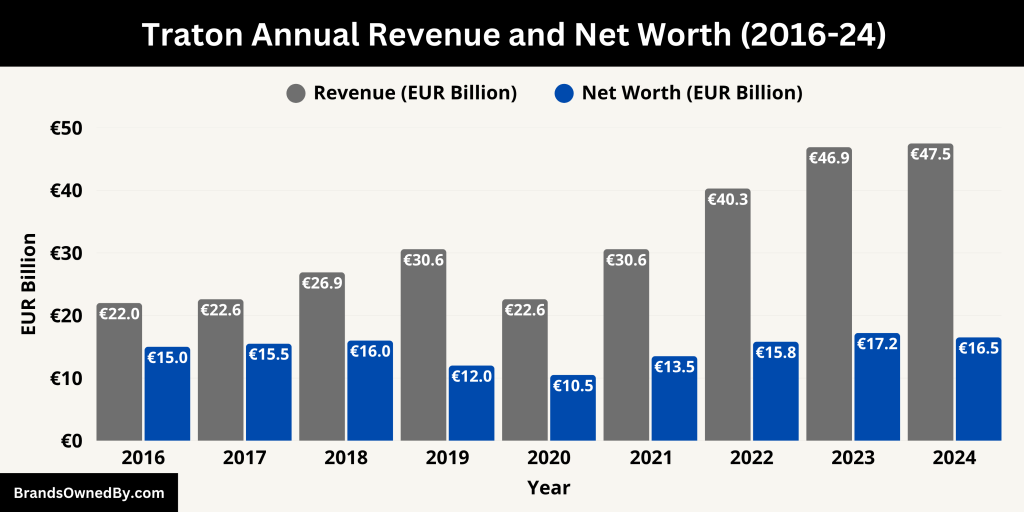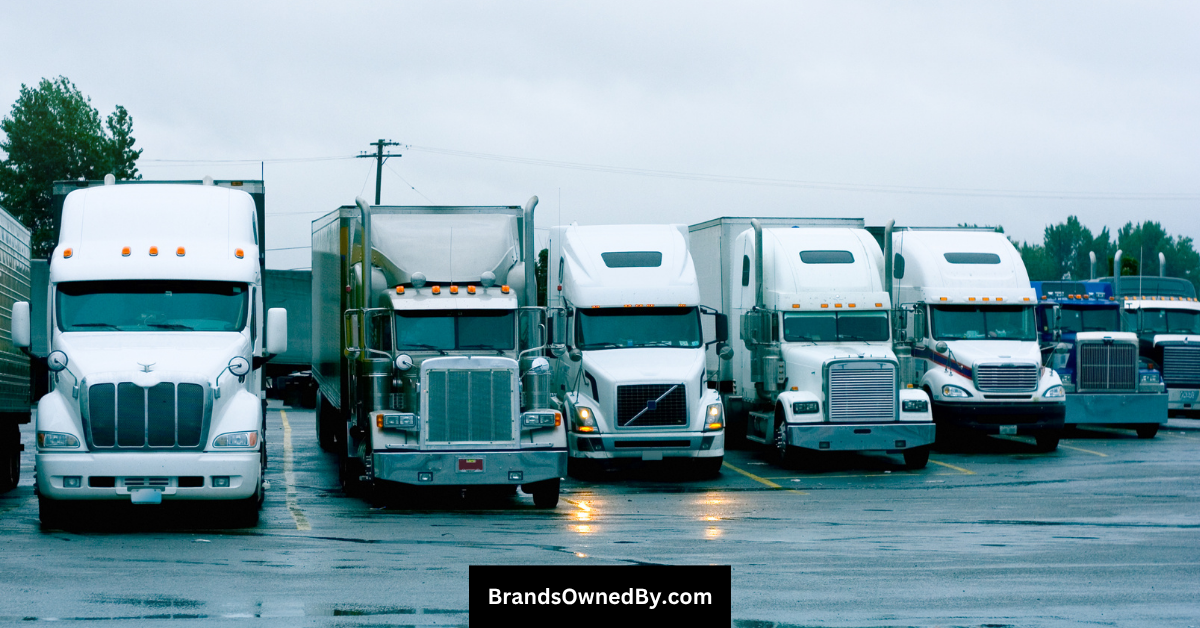Traton is a key player in the global commercial vehicle industry. For those wondering who owns Traton, it is a publicly traded company with a dominant shareholder. Traton has emerged as one of the leading manufacturers of trucks and buses, with well-known brands under its control.
Traton Company Profile
Traton SE is a leading global manufacturer of commercial vehicles. It focuses on trucks, buses, and associated digital and service solutions. Based in Munich, Germany, Traton operates some of the most recognized brands in the industry, including MAN, Scania, Navistar, and Volkswagen Caminhões e Ônibus.
The company was originally established as Volkswagen Truck & Bus GmbH in 2015, as part of Volkswagen AG’s strategy to consolidate its commercial vehicle operations. The goal was to create a unified global truck and bus division capable of competing with other industry giants like Daimler Truck, Volvo Group, and Paccar.
Founders and Origin
While Traton SE does not have traditional individual “founders” in the classic sense, it was founded by Volkswagen AG. The move was initiated under the leadership of Andreas Renschler, who served as the first CEO of Volkswagen Truck & Bus and later Traton SE. Renschler had previously worked at Daimler and played a central role in shaping the commercial vehicle strategy at Volkswagen.
He laid the groundwork for transforming the group into an independent global competitor by aligning its brands and operations under one roof.
Major Milestones
- 2015: Formation of Volkswagen Truck & Bus GmbH as a holding company for MAN and Scania.
- 2016: Strategic alliance with Navistar International in North America through a minority investment.
- 2018: Rebranding of the holding company to Traton Group, reflecting a broader international vision.
- 2019: Traton SE went public through an IPO on the Frankfurt and Stockholm stock exchanges, though Volkswagen retained majority control.
- 2020–2021: Traton announced and completed the full acquisition of Navistar, increasing its global presence, especially in the U.S.
- 2021–2022: Introduction of electrification strategies, including the launch of battery-electric trucks under Scania and MAN.
- 2023–2024: Deepened investment in autonomous driving technologies and digital services to support logistics and fleet management.
- 2025: Continued expansion in South America and Asia with a focus on green mobility solutions.
Traton today operates in over 120 countries and has thousands of employees worldwide. It is a major force in developing sustainable and innovative commercial transportation systems. The company’s integrated approach allows for regional customization of products while leveraging global scale and technology.
Who Owns Traton SE: Top Shareholders

Traton SE is a public company. However, the majority of its shares are held by a single corporate group. Volkswagen AG, a German automotive giant, is the controlling shareholder of Traton. The rest of the shares are freely floated and traded on public stock exchanges.
Volkswagen spun off Traton to better manage and grow its commercial vehicle division. Despite the public listing, Volkswagen retains strong control over Traton’s strategic decisions.
Here’s a detailed breakdown of Tranton’s top shareholders as of June 2025:
| Shareholder | Approx. Ownership (%) | Type | Role & Control |
|---|---|---|---|
| Volkswagen AG | ~87.5 % | Corporate (Parent Company) | Majority shareholder; full strategic and operational control of Traton |
| Free Float (Public Investors) | ~12.5 % | Public | Publicly traded shares held by various retail and institutional investors |
| – Prior & Nilsson Fond | ~0.128 % | Institutional | Minor stake; no control influence |
| – Indecap Fonder | ~0.095 % | Institutional | Passive investor |
| – Lupus alpha Asset Management | ~0.056 % | Institutional | Small shareholding |
| – PFP Advisory | ~0.054 % | Institutional | No decision-making power |
| – Amundi Asset Management | ~0.050 % | Institutional | Europe’s largest asset manager; minor investor in Traton |
| – LLB Asset Management | ~0.038 % | Institutional | Based in Liechtenstein; small stake |
| – Other institutional investors | ~0.3 % | Institutional | Distributed globally across UK, France, Germany, Sweden, etc. |
Volkswagen AG (≈ 87.5 %)

Volkswagen AG remains the dominant shareholder of Traton. Following a sale of ~2.2 % (around 11 million shares) in March 2025—but with plans to reduce further—VW now holds roughly 87.5 % of Traton’s shares.
This gives Volkswagen decisive control over corporate governance and strategic decisions. As the long-term majority holder, VW has authority in appointing board members, guiding business direction, and approving major actions. The recent sale aimed to increase market liquidity, yet VW remains firmly in control.
Volkswagen has publicly targeted a stake reduction to approximately 75 % + 1 share over the medium term. This would increase free float to around 25%, improving market dynamics and valuation, while retaining control.
Free Float / Public Investors (≈ 12.5 %)
About 12.5 % of Traton’s shares are held by a broad range of institutional and retail investors. This includes mutual funds, asset managers, and individual shareholders trading on European exchanges.
Institutional Asset Managers (≈ 0.7 %)
Key institutional investors include:
- Prior & Nilsson Fond (~0.128%)
- Indecap Fonder (~0.095%)
- Lupus alpha Asset Management (~0.056%)
- PFP Advisory (~0.054%)
- Amundi Asset Management (~0.050%)
- LLB Asset Management (~0.038%)
- Several others each holding around 0.03 %–0.05 %.
These institutions manage modest stakes, enough for investment exposure, but not for influencing boardroom decisions.
Other Shareholders (≈ 0.3 %)
An additional ~0.3% of shares are held by smaller investors spread across Sweden, France, Liechtenstein, Norway, the UK, Switzerland, Luxembourg, and others. These collectively represent the rest of the public float.
Who is the CEO of Traton?
Christian Levin has served as CEO of Traton SE since October 1, 2021. He simultaneously serves as President and CEO of Scania CV AB, aligning leadership across the group. Levin holds a dual academic background, with a B.Sc. in Business & Administration and an M.Sc. in Mechanical Engineering.
Under his leadership, Traton has focused intensely on electrification, digital transformation, and sustainable transport, with plans to boost battery-electric vehicle sales and profitability by 2029.
Leadership Style & Industry Role
Levin is a respected figure in the commercial vehicle industry. In 2025, he was elected Chairman of ACEA’s Commercial Vehicles Board, representing leading European truck manufacturers. He emphasizes cross-brand cooperation, modular vehicle platforms (“Traton Modular System”), and sustainable mobility strategies.
Career Background
- Joined Scania in 1994 as a management trainee.
- Held top roles at Scania: Director of Product Marketing, Managing Director of Italscania, Executive VP Commercial Operations (2010), and Executive VP Sales & Marketing (2016–2019).
- 2019: Appointed as COO of Traton SE, responsible for R&D and procurement.
- May 2021: Became CEO of Scania.
- October 2021: Elevated to Group CEO of Traton SE.
Decision-Making & Governance
Levin heads the Executive Board of Traton SE, guiding strategy across its core brands. He operates within a matrix structure, fostering collaboration across Scania, MAN, International Motors, and VW Truck & Bus. His responsibilities span R&D investment, electrification strategy, capital allocation, and execution of global synergy initiatives. The board oversees significant decisions, with Christian as the central figure.
Past CEOs of Traton SE
- Andreas Renschler (2016–2020): First CEO of Volkswagen Truck & Bus; established foundations for the group’s consolidation.
- Matthias Gründler (2020–October 2021): Led through IPO and integration phase; departed to allow new leadership to pursue the next growth stage.
- Christian Levin (October 2021–present): Currently driving electrification, digitalisation, and global expansion into 2025 and beyond.
Traton Annual Revenue and Net Worth

Traton SE generated solid revenues through 2024 and into 2025, despite facing short-term market pressures. The company reported €47.5 billion in total revenue for the full year 2024, marking a modest increase of around 1 percent compared to €46.9 billion in 2023. The growth was primarily driven by better pricing across its brands, a favorable product mix, and increasing contributions from financial services. In particular, Traton Financial Services grew by over 22 percent, reflecting rising demand for leasing, insurance, and fleet management solutions.
In the first quarter of 2025, Traton posted €10.6 billion in revenue, which represented a 10 percent year-over-year decline. This dip was largely attributed to reduced unit sales across brands such as Scania, MAN, and Navistar, following softer market conditions and production constraints. However, Traton management expects stronger performance in the second half of the year. The company maintained its outlook for 2025, with total annual revenue expected to remain between €45 billion and €50 billion, depending on demand recovery and operational efficiency in the remaining quarters.
Despite temporary volume pressures, Traton remains committed to strengthening revenue through investment in electric vehicles, modular product platforms, and expanding its services portfolio. These focus areas are expected to support long-term top-line growth across global markets.
Here’s a quick overview of the financial metrics of Traton:
| Metric | Value (2024–Mid‑2025) |
|---|---|
| 2024 Revenue | €47.5 billion (↑ 1%) |
| Q1 2025 Revenue | €10.6 billion (↓ 10% YoY) |
| 2025 Revenue Forecast | €45–50 billion (±5%) |
| Market Capitalization (Mid‑2025) | US $16.5 billion (~€13.6–13.9 billion) |
| Enterprise Value | $41.9 billion |
| Net Assets | $20.17 billion |
| Price-to-Sales Ratio | ~0.31× |
Net Worth and Market Capitalization
As of mid-2025, Traton SE’s market capitalization stands at approximately €13.6 to €13.9 billion, equivalent to around $16.5 billion. This figure marks a slight decrease from earlier valuations, reflecting investor caution due to ongoing macroeconomic uncertainty and lower-than-expected Q1 sales. However, the company’s long-term outlook remains stable, supported by consistent revenues and a diversified product portfolio.
In terms of net assets, Traton reported $20.17 billion in early 2025. This value, calculated as total assets minus liabilities, shows that the group has maintained a strong balance sheet. Its financial structure supports capital expenditures, R&D investments, and the scaling of new electric mobility platforms.
The company’s enterprise value, which includes debt and other obligations in addition to market cap, is estimated at $41.9 billion. This reflects Traton’s full valuation, accounting for its industrial operations, assets, and future cash flows. The price-to-sales (P/S) ratio remains low at approximately 0.31, suggesting that the market currently values Traton at less than one-third of its annual revenue. This may indicate that the stock is undervalued relative to its earnings potential, especially if revenue growth strengthens in the latter half of 2025.
Financial Outlook and Interpretation
Traton’s revenue performance in 2025 is resilient considering economic headwinds in the commercial vehicle sector. While Q1 numbers showed a slowdown, forward-looking indicators—including strong order intake and customer demand for electric vehicles—suggest recovery in the second half of the year. The company’s net worth remains strong, and its market position is secure thanks to strategic brand integration, disciplined capital management, and a focus on electrification and digital services.
Here’s an overview of Traton SE’s annual revenue and net worth for the past decade:
| Year | Revenue (€ billion) | Net Assets (€ billion) | Net Worth / Market Cap (€ billion) |
|---|---|---|---|
| 2016 | 22.0 | 16.80 | ~15.0 (estimated pre-listing) |
| 2017 | 22.6 | — | ~15.5 (estimated) |
| 2018 | 26.9 | 16.43 | ~16.0 (private) |
| 2019 | 30.6 | 14.13 | ~12.0 (shortly after IPO) |
| 2020 | 22.6 | 13.16 | ~10.5 (COVID impact) |
| 2021 | 30.6 | 13.44 | ~13.5 |
| 2022 | 40.3 | 14.37 | ~15.8 |
| 2023 | 46.9 | 16.48 | ~17.2 |
| 2024 | 47.5 | 17.84 | ~16.0–16.5 (mid-2025) |
Companies Owned by Traton
Traton owns several major commercial vehicle brands. These companies operate semi-independently under the Traton umbrella.
Here’s a list of the major companies and brands owned by Traton SE as of June 2025:
| Company/Brand | Headquarters | Core Functions | Regions Served | Strategic Focus |
|---|---|---|---|---|
| MAN Truck & Bus SE | Munich, Germany | Heavy trucks, buses, diesel engines, services | Europe, Asia, Africa, Latin America | Electrification, cost reduction, modular product development |
| Scania AB | Södertälje, Sweden | Premium trucks, buses, engines, fleet management | Europe, Latin America, Asia | Sustainability, modular design, electric and hybrid vehicles |
| Navistar International | Lisle, Illinois, USA | Trucks, buses (International brand), diesel engines | North America (U.S. & Canada) | U.S. market expansion, platform integration, electrification |
| Volkswagen Truck & Bus (VWCO) | Resende, Brazil | Light to heavy-duty trucks and buses | Latin America | Emerging markets, local production, electric delivery trucks |
| Traton Financial Services | Munich, Germany | Leasing, financing, insurance, used vehicle solutions | Global (via MAN, Scania, Navistar, VWCO) | Unified financial services, fleet lifecycle value |
| Traton R&D / Innovation Units | Munich, Södertälje, Lisle | Electric drivetrains, autonomous systems, connected services | Global (internal support structure) | Traton Modular System, sustainability, digital technologies |
MAN Truck & Bus SE
MAN is one of Traton’s core commercial vehicle brands. Based in Munich, MAN is a historic manufacturer with deep roots in German engineering. The company produces a wide range of heavy trucks, buses, diesel engines, and vehicle systems. MAN serves markets in Europe, Asia, Africa, and Latin America.
Under Traton, MAN has undergone significant restructuring, focusing on cost reduction, electrification, and modular product development. MAN eTruck and MAN Lion’s City E are among its most advanced electric models. MAN also handles the development of some components shared across Traton brands.
The company continues to operate semi-independently within the Traton Group while aligning with group-wide strategies on zero-emission mobility and digital fleet services.
Scania AB
Scania is a premium truck and bus manufacturer headquartered in Södertälje, Sweden. It is well known for its focus on durability, fuel efficiency, and modular vehicle design. Traton owns Scania through its full integration over a multi-year period.
Scania is a leader in sustainability, with strong progress in electric trucks, biofuels, and hybrid technologies. It also has its own financial services division and offers solutions such as Scania Fleet Management, which integrates real-time data for commercial vehicle operators.
As of 2025, Scania continues to expand into new markets while maintaining a stronghold in Europe and Latin America. Its vehicles are often customized for specific fleet needs using a flexible architecture.
Navistar International Corporation
Traton acquired Navistar International in 2021, giving the group a major foothold in North America. Navistar, headquartered in Lisle, Illinois, manufactures commercial trucks, school buses, and diesel engines under the International brand.
With this acquisition, Traton gained immediate access to the U.S. and Canadian markets, previously underserved in its portfolio. Navistar is now a fully owned subsidiary of Traton and works closely with MAN and Scania on technology sharing and platform integration.
The International brand continues to operate independently in the U.S. but is now gradually adopting Traton-wide systems for electrification and modular engineering.
Volkswagen Truck & Bus (VWCO)
Volkswagen Caminhões e Ônibus (VWCO), based in Brazil, is Traton’s primary commercial vehicle brand for Latin America. It was originally part of Volkswagen’s commercial division and was brought under Traton’s umbrella during its formation.
VWCO specializes in light- to heavy-duty trucks and buses designed for emerging markets. It has a strong manufacturing presence in Brazil and serves other Latin American countries. VWCO produces models such as the Delivery and Constellation truck lines.
The company has also begun to develop electric trucks for urban distribution. It maintains a robust dealer and service network across Latin America.
Traton Financial Services
Launched as a group-wide initiative, Traton Financial Services provides leasing, financing, and insurance solutions to customers of MAN, Scania, Navistar, and VWCO. The division has grown rapidly since its formation and contributes a significant portion of the group’s operating profit.
The service offerings include fleet leasing, maintenance packages, used vehicle financing, and digital payment systems. Traton Financial Services aims to create a unified financial platform across its brands to improve customer experience and lifecycle value.
Traton Innovation and R&D Units
Traton operates centralized innovation teams that focus on electric drivetrains, autonomous driving technologies, connected services, and software development. These units work across brands to develop the Traton Modular System—a scalable platform for next-generation trucks and buses.
In 2025, Traton expanded its investment in R&D hubs located in Germany, Sweden, and the U.S., supporting the group’s goal to electrify 50 percent of its product range by 2030.
Conclusion
To answer the question who owns Traton, the majority stake belongs to Volkswagen AG. Traton is publicly listed, but it operates under the control of its parent company. With powerful brands like Scania, MAN, and Navistar, Traton has a strong presence in both developed and emerging markets. Its focus on electrification and digitalization puts it in a competitive position for future growth.
FAQs
Does Traton own Scania?
Yes, Traton SE fully owns Scania AB. Scania became part of Traton when Volkswagen consolidated its commercial vehicle holdings under one group. Scania now operates as one of Traton’s core brands, with a focus on premium trucks, buses, and sustainable transport technologies.
Who are MAN trucks owned by?
MAN Truck & Bus SE is owned by Traton SE. MAN has been part of the group since its early formation as Volkswagen Truck & Bus. As a subsidiary of Traton, MAN is responsible for producing a wide range of heavy commercial vehicles and buses, serving customers across Europe and beyond.
How much did Traton pay for Navistar?
Traton SE acquired Navistar International in 2021 for approximately US $3.7 billion. This deal gave Traton a majority stake in the U.S.-based manufacturer, expanding its presence in the North American market and enabling closer technological collaboration between Navistar and Traton’s other brands.
Who owns Traton Group?
Traton SE is majority-owned by Volkswagen AG, which holds around 87.5% of its shares as of 2025. The remaining shares are publicly traded and held by institutional and retail investors. Although listed on the Frankfurt and Stockholm stock exchanges, strategic control remains with Volkswagen.
What does TRATON Group do?
Traton SE is a global commercial vehicle group that designs, manufactures, and sells trucks, buses, and related services. The company focuses on delivering transport solutions through its major brands: Scania, MAN, Navistar, and Volkswagen Truck & Bus (VWCO). Traton also offers digital fleet services and financial products through its dedicated subsidiaries.
What is TRATON business area?
Traton’s core business area is commercial vehicles, including medium- and heavy-duty trucks, buses, and powertrains. The group also operates in financial services, such as leasing, insurance, and fleet management. Its geographical business areas span Europe, North America, South America, and selected Asian and African markets.
Who Makes TRATON Trucks?
Traton trucks are made by its subsidiary brands, not under the Traton name. These include:
- MAN Truck & Bus in Europe
- Scania AB in Europe and Latin America
- Navistar International in North America
- Volkswagen Truck & Bus (VWCO) in Latin America
Each brand is responsible for its own production, tailored to local markets but aligned with Traton’s global strategies in electrification and modular engineering.
Who owns Traton?
Volkswagen AG owns nearly 87.5% of Traton SE as of June 2025 making it the controlling shareholder.
Is Traton a part of Volkswagen?
Yes, Traton is a subsidiary of Volkswagen AG, though it is publicly traded.
What brands does Traton own?
Traton owns MAN, Scania, Navistar, and Volkswagen Caminhões e Ônibus.
Where is Traton headquartered?
Traton SE is headquartered in Munich, Germany.
When did Traton acquire Navistar?
Traton completed the acquisition of Navistar International in 2021.
Who is the CEO of Traton?
Christian Levin is the CEO of Traton as of 2025.
What is Traton known for?
Traton is known for manufacturing trucks and buses under major global brands.
Is Traton publicly traded?
Yes, Traton SE is listed on stock exchanges, but most shares are owned by Volkswagen.

